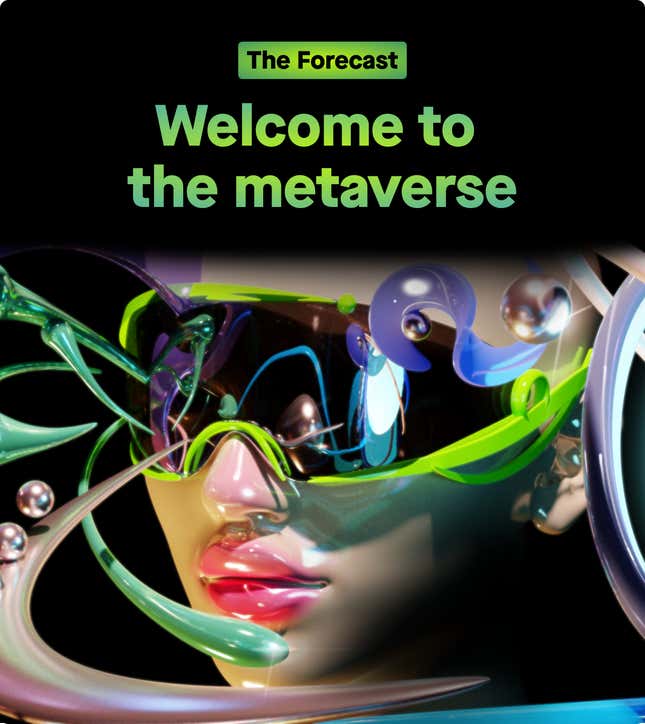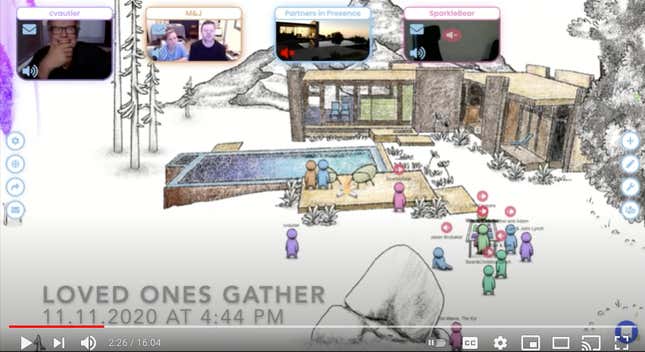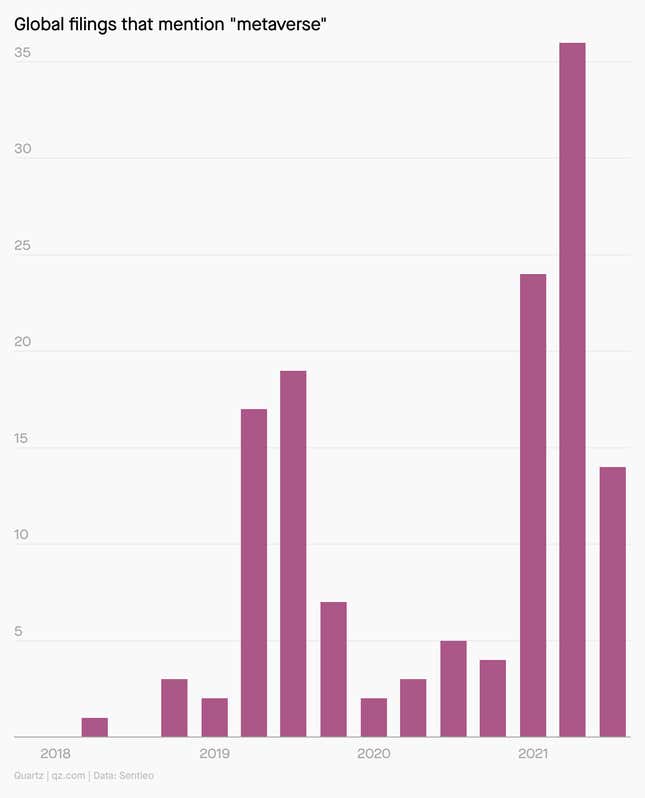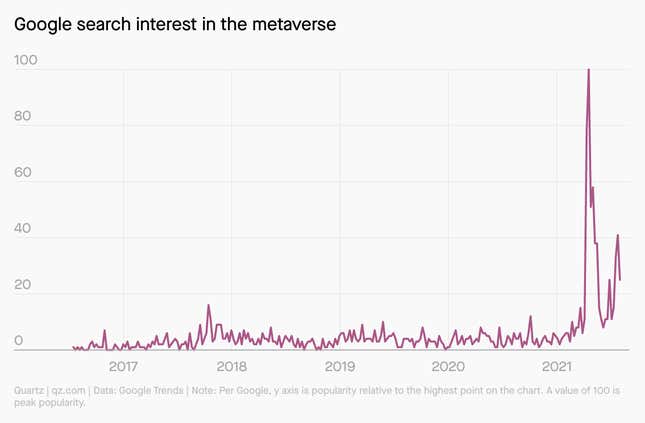
Your day in the metaverse is much like your day in the real world. Your digital self gets dressed, goes to work, shops at your favorite stores, sees friends, plays games, and goes to concerts. Every person has an avatar, every brick-and-mortar store has a virtual counterpart. If the internet as we experience it now is two-dimensional, think of this new digital world as three-dimensional: A little like Fortnite, a little like Second Life, and a lot TBD.
Depending on who you ask, the metaverse is either a meaningless buzzword or the next big digital platform. One thing is for sure: A lot of people in Silicon Valley have started talking about building it. If the metaverse is for real, it’s a chance to rethink what we want our digital lives to be like. And that means it really matters who builds it and what they’re after.
What is the metaverse, anyway?
I polled Twitter for definitions of the metaverse—serious or tongue-in-cheek—and this is what I got:
- A network of virtual worlds (Invision’s Benjamin Bertram Goldman)
- The internet, but skeuomorphic. (The Verge’s Adi Robertson)
- A completely nonsense rebrand of “the internet” (The Wall Street Journal’s Christopher Mims)
- The Beyond section of Bed, Bath & Beyond (Sparrow Advisers’ Ana Milicevic)
- Basically Neopets (Quartz’s Michelle Cheng)
Perhaps the most considered definition comes from Matthew Ball, the venture capitalist whose writing has inspired tons of metaverse chatter in recent years. He describes the metaverse as a “successor state to the mobile internet,” and a “platform for human leisure, labor, and existence at large.” It will be always-on, span physical and digital worlds, have its own economy, and be interoperable—a way for digital environments like Peloton, Xbox, and Slack to interact.
Stranger than science fiction
The term “metaverse” originates in science fiction: The writer Neal Stephenson coined the term in his 1992 novel Snow Crash, as a persistent virtual reality world navigated by the protagonist. But “mirrorworlds” like this form the basis for other sci-fi media like:
- The Matrix film series
- The novel and film Ready Player One (the OASIS)
- The Netflix series Stranger Things (the Upside Down)
The pandemic
It’s not an accident that we’re talking about this now. The world has spent way more time online during the Covid-19 pandemic and many of us experimented with virtual experiences we might otherwise not have tried.
When I asked about the metaverse on Twitter, entrepreneur Brian Swichkow explained to me that he got married in the virtual world Topia last November. And you should see it—it’s pretty incredible.

Since many loved ones couldn’t attend because of the Covid risk, Swichkow built a digital replica of the wedding venue, a house in Topanga, California. Wedding guests could navigate their avatars through the venue while interacting with one another over video chat. The physical ceremony, which counted eight attendees including the bride and groom, was livestreamed to 140 guests who navigated to the right place in Topia.
This online wedding is not exactly in the metaverse. But it’s emblematic of why we’re discussing it: Necessity is the mother of invention, and a year indoors pushed us to reimagine life online. The notion of a more immersive digital world started to feel more realistic.
Charted: mentions of the metaverse
Metaverse is the word on everyone’s lips (and in their documents and searches).


Companies vying for metaverse status
Recently two major tech firms—Facebook and Microsoft—have started talking publicly about the metaverse. In late July, Mark Zuckerberg told employees that Facebook, which has around 3 billion users and massive investments in virtual reality through Oculus, will become a “metaverse company” in the near future. In May, Microsoft’s Satya Nadella said at a conference that he is positioning the company’s cloud service Azure as a leader in the “enterprise metaverse.”
But the metaverse conversation usually concerns games like Fortnite, Roblox, or Minecraft (owned by Microsoft), that simulate a metaverse-like experience. More than 27 million players logged onto Fortnite last year to watch Travis Scott live in concert. Gucci recently sold virtual handbags within Roblox. And the nonprofit Reporters Without Borders built a library of otherwise censored journalism within Minecraft for people all over the world to access. Other companies like chipmaker NVIDIA, game engine Unity, and social app Snapchat, which has focused on augmented reality and maps in recent years, are often discussed as potential builders of the metaverse, too.
Whether these companies are all building one metaverse, separate metaverses, or no metaverse at all is to be determined. A collective metaverse to rule them all will require unprecedented cooperation between private companies, most of whom comfortably control closed ecosystems and have spurned data sharing.
If the hype is real and the successor to the internet is being built, then who builds it matters immensely. The internet was largely built by academic and government-funded research, but the metaverse is mostly drawing interest from private companies. One of the primary companies thinking about and possibly building the metaverse is Epic Games, which owns Fortnite. Here’s CEO Tim Sweeney’s take on what’s at stake from way back in 2016, a year before Fortnite even launched:
This Metaverse is going to be far more pervasive and powerful than anything else. If one central company gains control of this, they will become more powerful than any government and be a god on Earth.
🔮 Predictions
Facebook won’t win. Bloomberg’s Tae Kim thinks that success in the metaverse will depend on advanced semiconductors and software tools. “Facebook is not strong on either front.”
The metaverse won’t just be for fun. Roblox’s Manuel Bronstein thinks that while the metaverse-like experiences of today are mostly about fun—gaming, concerts, activities—the metaverse of the future will also involve learning, working, and ordinary tasks.
We’re creating the “Tchotchke internet.” The writer Ryan Broderick says our current internet—full of “digital flair and knick-knacks”—is a possible precursor to the metaverse.
Our physical and online personas will merge. The metaverse will meld the IRL versions of us with the personalities we have crafted for ourselves on social media, says Cathy Hackl of Futures Intelligence Group.
Most of the content won’t be from game developers. It will largely be user-generated or AI-generated, says Jonathan Lai of Andreesen Horowitz.
Sound off
What do you think is the future of the metaverse?
The metaverse is coming, eventually.
We’re already in the metaverse.
In last week’s poll about whether the tech boom will ever end, about 50% of respondents said we’d see a little increase in VC funding in the second half of 2021.
Reading list
Mark Zuckerberg’s vision for the metaverse in an interview with the Verge. And more from the New Yorker.
A nine-part metaverse primer from VC Matthew Ball.
The four stages of content that will lead us to the metaverse, from VC Jonathan Lai.
How virtual worlds could change work, from Quartz. More here.
Neal Stephenson explains Silicon Valley’s obsession with the word he coined, in Vanity Fair.
Louis Vuitton is the latest luxury brand to make its own video game, from Quartz. And Peloton is making one, too.
Have a great week,
—Scott Nover, emerging industries reporter and future resident of the metaverse
Additional contributions from Walter Frick.
One 😂 thing
On CNBC, Jim Cramer describes the metaverse: “You say ‘I like the way that person looks in that shirt, I want to order that shirt’…Let’s say you’re alone and you’re a little lonely… you say to the first person you see: ‘Do you like the Mozart?'”
